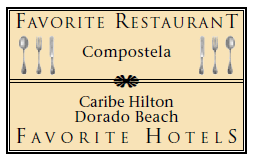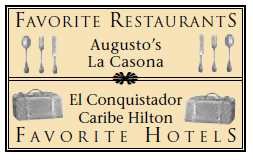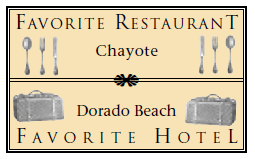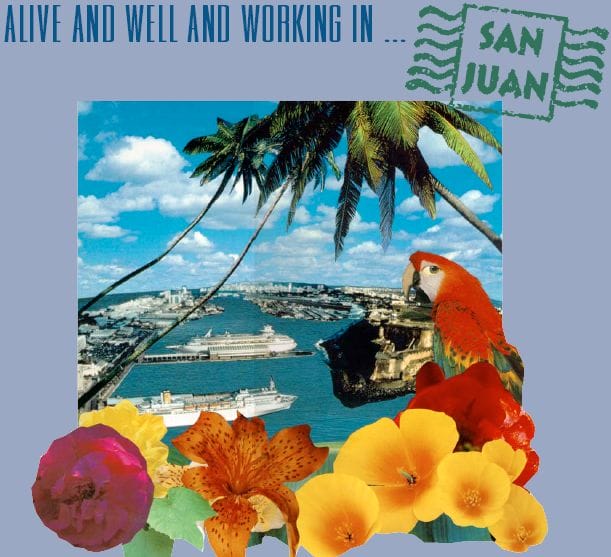Our series on alumni in different cities travels to Puerto Rico, home to approximately 3.7 million people – including 150 alumni – in industries ranging from banking, insurance and food processing to real estate, law and tourism. The 100-mile long island is also home to more than 200 beaches, year-round temperatures in the 80s and a port that is the cruise ship capital of the Caribbean. Whether you go for business or the beach, consider taking along our list of restaurants and hotels. They come highly recommended.
As if running Puerto Rico’s largest bank, aggressively expanding operations into the U.S., Central America and the Caribbean, and targeting new initiatives in the family business sector isn’t enough, Richard Carrión is also aiming to get Puerto Rico chosen as the site for the 2004 Summer Olympics.
Carrión is chairman, president and CEO of BanPonce, where he oversees a financial services holding company with $16.8 billion in assets and a market cap of $1.8 billion. Banco Popular, the corporation’s full-service commercial banking subsidiary, has 170 branches in Puerto Rico and focuses mainly on the small and middle market.
In the U.S., Banco Popular has expanded its empire by targeting emerging Hispanic communities and setting up user-friendly neighborhood banks. The company has 30 branches in New York, six in New Jersey, eight in Chicago and four in Los Angeles, and plans to expand this year into Florida and Texas. It is already the largest commercial bank lender of SBA loans in the U.S.
 This northern strategy complements an expansion to the south as well. Banco Popular currently offers its ATM service to consumers in the Dominican Republic and is in the process of building a system in Costa Rica. “We are looking for local partners in Central America and the Caribbean,” says Carrión. “We also have an investment in a Jamaican bank and our own banking network in the Virgin Islands.”
This northern strategy complements an expansion to the south as well. Banco Popular currently offers its ATM service to consumers in the Dominican Republic and is in the process of building a system in Costa Rica. “We are looking for local partners in Central America and the Caribbean,” says Carrión. “We also have an investment in a Jamaican bank and our own banking network in the Virgin Islands.”
Within Puerto Rico itself, the family business sector is a clear fit for Banco Popular. “It is very much our market, and it is an extremely important one for Puerto Rico,” says Carrión, who has five children ages 4 to 16. “Family-controlled companies are more committed to the business and they are good competitors.”
One of the biggest challenges for family businesses, he adds, “is stewardship of the corporation. As succeeding generations come, who is going to manage the company? We like to say that running a business is extremely difficult and running a family is extremely difficult, so running a family business is difficulty squared.”
Banco Popular is offering educational seminars to family businesses — in conjunction with the Wharton Family-Controlled Corporation Program — and helping them “put in place the mechanisms that will improve their opportunities for survival. We are also helping our commercial loan officers better discern the difference between a stable family business and one that is headed for trouble.”
Banco Popular itself was run by Carrión’s father and grandfather before Richard Carrión took over as president in 1985 and as CEO in 1989. In 1990, the company merged with its rival, Banco de Ponce.
As for the Clinton administration’s recent repeal of Section 936 of the U.S. tax code, which in effect eliminates a set of special tax breaks for U.S. companies operating in Puerto Rico, Carrión expects a short-term negative impact on Banco Popular — which does a considerable amount of business with mainland companies that operate on the island — as well as on the Puerto Rican economy. “We will see a significant exodus of 936 funds from the market, which will have to be replaced with slightly more expensive ones. But in the long run we should be all right. Puerto Rico needs to diversify its economic base more than it has, and there are already mechanisms on the manufacturing side for doing this.”
Then there are the Olympics. Carrión, an avid racquetball player, is lobbying hard to have Puerto Rico chosen as host for the 2004 Summer Olympics. “It would be very helpful for our economic and social development,” says Carrión, who suggests that the hotel capacity issue be solved by putting people up in cruise ships in the San Juan harbor.
“What makes the Olympic Games great is the philosophy of competition,” he adds. It’s true that the commercial side of the Olympics has allowed the philosophy to grow and be present in more parts of the world, but it is the strength of the Games that should be brought to the forefront.”

After Rafael Roca left Wharton he joined the family business, which back then consisted of coffee and sugar plantations, stone quarries and cattle. “It wasn’t for me,” says Roca. “Coffee plantations are up in the mountains. I preferred the city. I went to work for GE’s industrial sales division for half the salary and without the car my father had offered me.”
He spent four months at GE, four months at Seagrams’ rum distillery, and then, in 1950, moved to Puerto Rican-American Insurance Co. (PRAICO).
He has been with them ever since in a variety of positions, including co-owner and chairman. “When I first started, PRAICO had five employees; now it has 566,” says Roca. In 1993, the last year production was directly responsible to him, the group was the largest property/casualty insurer in Puerto Rico. Now, with about $110.6 million in revenues, it is the third largest in a field of approximately 109 property casualty companies. It also has a life insurance company.
 In 1979, PRAICO was acquired by the Continental Insurance Company of New York. Five years later it entered into a partnership through a reinsurance pooling agreement with Pan American Insurance Co., thereby enabling Roca, who that year had acquired Pan American, to stay with the Group and aggressively grow the companies.
In 1979, PRAICO was acquired by the Continental Insurance Company of New York. Five years later it entered into a partnership through a reinsurance pooling agreement with Pan American Insurance Co., thereby enabling Roca, who that year had acquired Pan American, to stay with the Group and aggressively grow the companies.
In 1991 Continental sold the PRAICO companies and Roca sold the Pan American companies to Mapfre Internacional, S.A., a subsidiary of the largest public insurance company in Spain. Under the terms of the deal, Roca stayed on as chairman and CEO until last April. He is now chairman and chief investment officer.
Today, Roca and his wife are involved in a number of philanthropic ventures, including homeless shelters and the local Catholic university. He is particularly interested in music, and through his company has provided scholarships to Puerto Rican music students who wish to study in the U.S. He sits on 18 boards, seven of them outside Puerto Rico, including the board of trustees of the National Symphony Orchestra at the Kennedy Center in Washington, D.C. His brother, Gaspar, W’47, is currently head of El Vocero, the largest newspaper in Puerto Rico.
Roca says his business philosophy can be summed up by Winston Churchill’s commencement speech at Oxford: “Never give up; never give up; never give up.” His biggest challenges over the years have been very stiff competition from U.S. and foreign companies, adverse loss ratio periods when rates could not be raised due to political and other pressures, and the stress of hurricane seasons.
Although he has no immediate plans to move on from PRAICO, he does not discount the possibility of another venture. “One of these days there might be something else I would enjoy doing, maybe in the field of investments,” he says.

Manuel Dubón’s immersion in Puerto Rico’s economy and politics is impressive and it goes back a long way.
Dubón, who earned a JD degree from Penn in addition to his undergraduate business degree in accounting and finance, practiced law for almost two decades, with several short interruptions, including one year as executive officer and legal counsel to the Senate Finance Committee in Puerto Rico, two years as a captain in the U.S. Army in Europe and two years as the island’s economic development administrator.
“In 1978 I was responsible for drafting the law and implementing the economic policy that made U.S. multinationals (936 companies) start paying corporate taxes to Puerto Rico,” he says. “We changed the industrial incentive system from one of 100 percent tax exemption to one of partial taxation. I wasn’t a very popular fellow.”
The program also offered a deep discount of the tax if the 936 companies voluntarily elected to reinvest all or part of the annual profits in Puerto Rico. “It worked like a charm, helping to defray, in part, the cost of the modern educational, transportation and public utility infrastructure that Puerto Rico enjoys today,” Dubón adds.
 In 1986 Dubón stopped practicing law to concentrate his attention on business enterprises. He is president and CEO of the D Group Equities holding company and spends about one half his time with D Group Commercial Equities Associates, a real estate partnership that does development, property management and construction. Through D Group Capital Corp. he is involved with the group’s financial services and investments in the equity and financial markets. He is also chairman of The Bank and Trust of Puerto Rico, a private bank he helped create, and secretary of Mendez & Co., one of the largest food, liquor and beer wholesalers in Puerto Rico. He is involved with Mendez’s affiliated Intership and Intermarine groups, the largest stevedore and marine terminal operators of the Port of San Juan.
In 1986 Dubón stopped practicing law to concentrate his attention on business enterprises. He is president and CEO of the D Group Equities holding company and spends about one half his time with D Group Commercial Equities Associates, a real estate partnership that does development, property management and construction. Through D Group Capital Corp. he is involved with the group’s financial services and investments in the equity and financial markets. He is also chairman of The Bank and Trust of Puerto Rico, a private bank he helped create, and secretary of Mendez & Co., one of the largest food, liquor and beer wholesalers in Puerto Rico. He is involved with Mendez’s affiliated Intership and Intermarine groups, the largest stevedore and marine terminal operators of the Port of San Juan.
“We have professional management in all these entities; my job is to supervise performance and help set policy and goals. I also love to negotiate, structure complex business transactions … and above all create institutions,” he says.
Dubón is married and has five children, including a Wharton graduate and a current Wharton student. His brother Luis also went to Wharton, W’56, and is a lawyer.
Despite his business responsibilities, Dubón has been an active member of the New Progressive Party that advocates statehood for Puerto Rico. He was a delegate to the Republican National Convention in San Diego and counselor of the Dole campaign in Puerto Rico.
On the subject of President Clinton’s repeal of Section 936 of the U.S. Tax Code, Dubón says he would have preferred a “period of transition rather than an immediate phase-out of the tax breaks, with some alternative relief in the form of a new wage-based tax credit incentive.” But he doesn’t think repeal will have the disastrous effects that some are predicting for Puerto Rican industry.
“Our industrial sector today is much more sophisticated and has a stronger capital base than before,” Dubón says. “It would cost billions to replace that production capacity in addition to the lengthy environmental permit process that any new plant installation or relocation would have to undergo.”

At the same time that Carmen Culpeper was developing financing alternatives for the public and private sectors at Clark Melvin Securities Corp. in San Juan, she was also doing independent management consulting for such clients as the P.R. Government Development Bank, the University of Puerto Rico, Grenadier Realty, the P.R. Buildings Authority and Triple S, the biggest health insurance company in Puerto Rico.
 Today, Culpeper is president of Finapri, a subsidiary of Triple S, which finances the purchase of insurance policies in property, public liability and other areas.
Today, Culpeper is president of Finapri, a subsidiary of Triple S, which finances the purchase of insurance policies in property, public liability and other areas.
“The company was on the books in May of 1996 but I really started operating it and hiring people last September. We currently have five employees, a number that will probably double this year, and a million dollars in premium financing,” says Culpeper who grew up on the island and graduated magna cum laude in finance from the University of Puerto Rico. The company eventually plans to expand into equipment leasing and other types of financing.
After Culpeper graduated from Wharton, she worked for Peat Marwick Mitchell as a consultant and then joined Volkswagen as their finance manager in Puerto Rico. From 1973 to 1977 she was a control unit manager for Citibank, N.A. in Puerto Rico before taking a year’s leave of absence to be the financial and economic affairs aide to the Mayor of San Juan. From 1978 to 1981 she was executive aide to the Mayor, coordinating the personnel, finance and administrative units and directly supervising the risk management function for San Juan.
In 1981 she was appointed Secretary of the Treasury for Puerto Rico, and in 1985 rejoined Citibank as vice president, Latin American Bank Group, New York.
From 1988 to 1992 Culpeper was president and CEO of the State of New York Mortgage Agency. In 1992 she joined Donaldson, Lufkin & Jenrette as manager of DLJ’s Puerto Rico account and oversaw a $700 million tax revenue anticipation note issued for the Commonwealth.
She stayed at DLJ until 1995 when she moved to Clark Melvin Securities Corp. as senior vice president.
Culpeper is optimistic about the repeal of Section 936. Although the legislation last summer eliminated new tax breaks retroactive to Jan. 1, 1996, it agreed to phase them out over 10 years for companies already in Puerto Rico. This 10-year grace period “provides time to create something new in the interim,” she says, “such as incentives on the local tax level that would attract new corporations to the island.”

Even while he was at Wharton, Victor Gonzalez took courses at Penn in biology as preparation for a master’s degree in forestry from Yale.
Today, all his entrepreneurial business ventures share, to varying degrees, two goals: protecting the environment and making money. Or as Gonzalez puts it, “It’s a matter of combining what I learned at Yale about ecology with what I learned at Wharton about finance.”
Gonzalez’ business ventures are grouped into three companies. Puerto Rico Land and Fruit Co. produces and sells organically grown coffee, manages ecological restoration projects and is involved in setting up a mitigation bank. The concept behind a mitigation bank, says Gonzalez, is to establish an inventory of restored and created wetlands which are then sold as credits to developers whom regulatory agencies allow to impact environmentally sensitive areas.
 “No one else in Puerto Rico is doing this, although it is becoming more common in the U.S.,” he adds. “These mitigation banks are seen as a way of resolving the main conflict between the business and environmental communities by offering companies a way to both make money and protect our environment.”
“No one else in Puerto Rico is doing this, although it is becoming more common in the U.S.,” he adds. “These mitigation banks are seen as a way of resolving the main conflict between the business and environmental communities by offering companies a way to both make money and protect our environment.”
Gonzalez has two other firms, Mateco and Celta, which import lumber, plywood, steel, cement and related materials for the building and construction industries. Altogether he employs about 200 people.
“The theme behind everything I have done is that of the small- or medium-sized businessman taking the risks and getting the rewards, rather than working out the solutions to problems through a large corporate structure.”
Born in Havana, Cuba, Gonzalez moved with his family to Puerto Rico in 1962 at age 10. He and his wife, Tania Serralles, C’78, have three boys. Gonzalez sits on the board of a nonprofit conservation organization based in Philadelphia and serves as an adviser to Yale’s School of Forestry in New Haven.
“I have been extremely happy living in Puerto Rico,” he says. “I am very grateful for the way the Puerto Rican people freely and openly welcome foreigners like myself, and offer us the same opportunities as they have themselves. No other Caribbean or Latin American country is like this. It shows how big Puerto Rico’s heart is.”

In late 1992, Manuel De Juan was a brand manager in charge of all Procter & Gamble products sold in the Dominican Republic and Haiti. An old friend who happened to be executive director of the Puerto Rico Tourism Co. called him with an offer he couldn’t refuse — to head up the tourism agency’s worldwide marketing of Puerto Rico as a destination, primarily for vacationers but also for the group and convention market.
 “I spent three weeks trying to convince myself not to take it, but in the end I decided it was too good an opportunity to pass up,” says De Juan.
“I spent three weeks trying to convince myself not to take it, but in the end I decided it was too good an opportunity to pass up,” says De Juan.
The Puerto Rico Tourism Co. is a public corporation of the Government of Puerto Rico, and as such has top-level backing to make tourism into the engine of economic growth for the whole island. It’s a challenge that sends De Juan out on the road 50 percent of his time inviting the world to “discover the continent of Puerto Rico.”
“’Continent’ is a rather dramatic term, but we use it because there are so many experiences to be enjoyed here,” says De Juan, going on to mention the island’s 200 beaches, year-round average temperature in the 80s, rich culture and overnight options that range from luxury resorts to more affordable hotels and inns.
De Juan’s responsibilities include infrastructure and public policy issues designed to promote tourism. In 1993, for example, “we created a law to provide incentives for hotel room development in Puerto Rico that has caused an explosion of rooms being constructed — and filled. This year we have about 10,200 rooms; next year we anticipate 13,000.”
On the marketing side, “we recently did a quick inventory of our video production and realized that if you count the videos we have either produced directly or been a part of, it comes to 500 hours of programming that has been shown in a number of outlets, including national TV. ‘General Hospital,’ for example, came down here and filmed about a month’s worth of episodes. The shows were stunning.”
De Juan grew up in Puerto Rico and graduated cum laude from Yale University with a degree in economics. He and his wife, a marketing research manager at P&G (where they met), have a year-old son.
“The current governor of Puerto Rico is a pediatric surgeon who brought with him into government a cadre of young professionals from the private sector to accomplish a number of top-priority goals, including the development of tourism,” says De Juan. “I knew when I took this job that I was coming into a situation where I was getting a lot of support and could truly make an impact on the future of Puerto Rico.”

Sila Gonzalez divided her time last fall between taking care of her infant son, working occasionally for a real estate developer and helping her mother, Sila Calderon, run for mayor of San Juan as the Commonwealth Party candidate. (She won.)
 During the course of the campaign Gonzalez had an opportunity to meet many Puerto Ricans at rallies and fundraising events — an experience which she says kindled her interest in working in the government at some point in the future. “There is so much poverty still in Puerto Rico. You feel that perhaps if you had a position in government you could do something to help people out.”
During the course of the campaign Gonzalez had an opportunity to meet many Puerto Ricans at rallies and fundraising events — an experience which she says kindled her interest in working in the government at some point in the future. “There is so much poverty still in Puerto Rico. You feel that perhaps if you had a position in government you could do something to help people out.”
At the moment, though, Gonzalez has set aside several years to raise a family. She attended law school at Boston University after graduating from Wharton and then worked in the Boston regional office of the U.S. Environmental Protection Agency. While at BU, she met her husband, a doctoral student in physics who decided to switch to law. He earned his JD at Harvard Law School and now works for a law firm in San Juan.
Gonzalez and her husband — both of whom grew up in Puerto Rico — returned home in 1992. She worked for a small law firm and then a large one, O’Neill & Borges, until she took leave in October 1995 to start a family.
Gonzalez’ affiliation with the Commonwealth Party — as opposed to the Statehood Party or the Independence Party — is rooted in the feeling that Puerto Ricans have “a different culture, history and language. I feel more Puerto Rican than American. On the other hand, I don’t think independence would be economically feasible. We get a number of benefits from the U.S., although we reciprocate by paying some taxes, contributing to the armed forces and so forth.”
As for her mother’s election as mayor of San Juan, Gonzalez acknowledges that the family will have less privacy than before. “If I have to make a sacrifice in terms of our family relations, I do it gladly because I know she is going to do great work.”

A few years ago, says Salustiano (“Tito”) Alvarez, his company — one of the top three food and liquor distributors in Puerto Rico — was able to import beers only in 10-ounce cans and in bottles that had to comply with a specific shape and color.
 The Puerto Rican government, supported by the labor unions, did that “to protect local industry,” says Alvarez. “But we lobbied hard to get those restrictions removed, even arguing at one point that they were unconstitutional.” The lobbying paid off, and the company won a permit allowing greater flexibility with regard to beer containers.
The Puerto Rican government, supported by the labor unions, did that “to protect local industry,” says Alvarez. “But we lobbied hard to get those restrictions removed, even arguing at one point that they were unconstitutional.” The lobbying paid off, and the company won a permit allowing greater flexibility with regard to beer containers.
Today Mendez & Co.’s most popular brand is Heinekens, offered in several different shapes and sizes, followed by Miller. The company also sells distilled spirits and wines and has a food division that offers such well-known brands as General Mills and Beechnut. Sales are in excess of $200 million a year.
And should continue to grow. “The economic news seems to be very good,” Alvarez says. “The repeal of Section 936 will be of minor consequence to our business. The only way it could affect us is in the cost of money. Right now 936 funds are obtained at very reasonable rates. Those rates will probably go up once the 936 funds disappear from Puerto Rico.”
Mendez & Co. is a family business started in 1912 by two of Alvarez’ uncles. His father was the third partner. Today the groceries division is headed by a vice president who is one of Alvarez’ nephews. The liquor distribution division is headed by a vice president who is the second of his two sons. “Then I have a third nephew who takes care of the operational aspect of the company,” says Alvarez, who has a daughter as well. “There are some outside people who are partners also but we consider all people working with us as members of the family.”


























